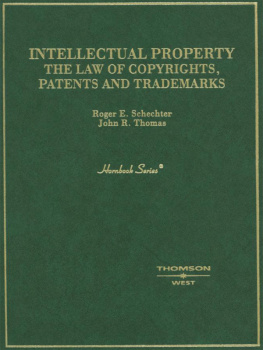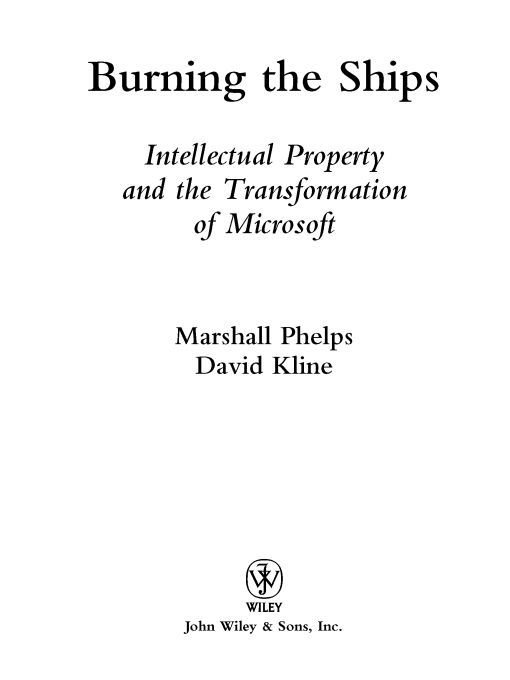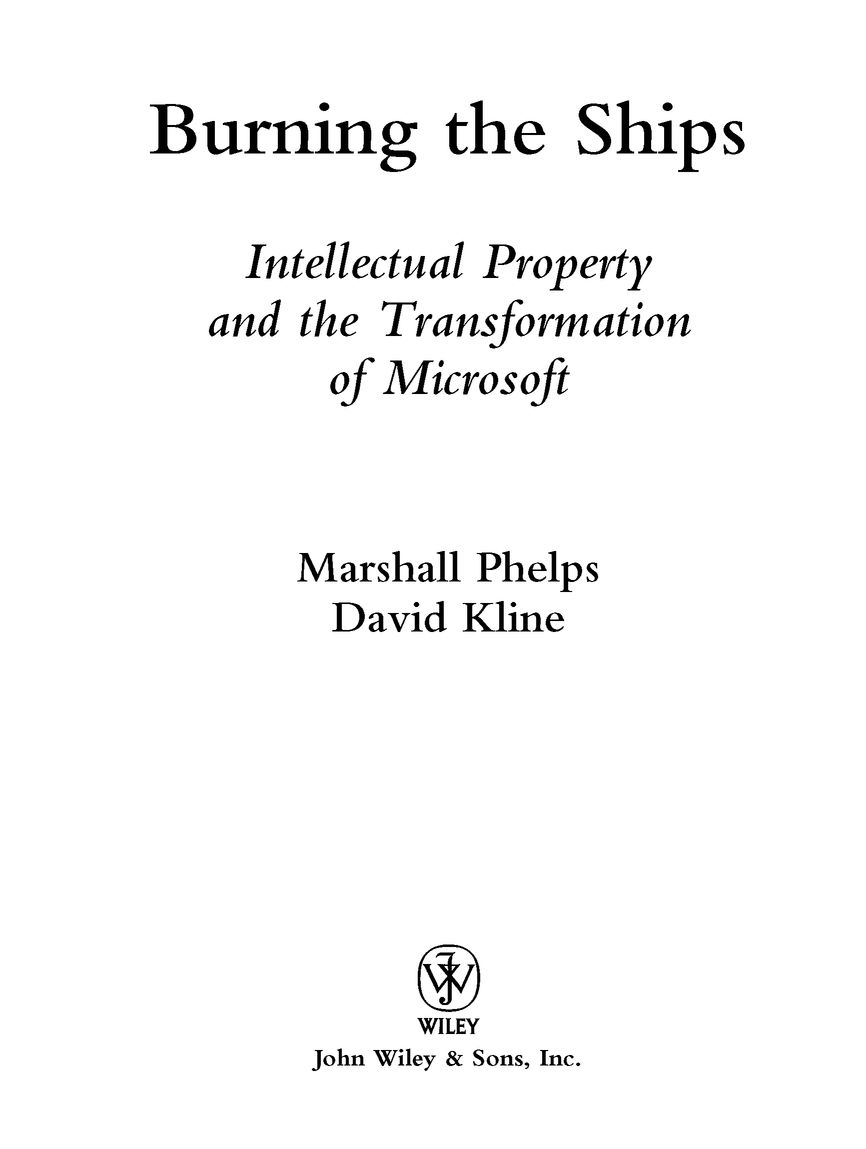Table of Contents
Praise for Burning the Ships
When Marshall Phelps took the job at Microsoft in 2003, many in the industry believed he was on a fools errand. The task of helping to transform the culture and business practices of Microsoft through the use of its intellectual property seemed impossible. Burning the Ships proves that Marshall is the unchallenged master in designing creative uses of intellectual property to enhance business performance. And through his collaboration with David Kline, theyve accomplished something equally unique: a thoroughly entertaining and informative cant wait to get to the next page read.
Daniel McCurdy
Chairman, Patent Freedom
Burning the Ships offers a dramatic insiders account of how Microsoft used intellectual property to remake its business strategy and embrace the open source movement and the new open innovation worldwith real-world benefits for large enterprise customers and chief information officers everywhere.
Jim Noble
Chairman, World BPO Forum
Past President, Society for Information Management
When Marshall Phelps talks about intellectual property strategy, business leaders would be wise to listen closely. More than anyone else in business today, Marshall understands how open innovation has changed the rules of the IP strategy game. Its time we learned the new rules!
Ruud J. Peters
CEO, Philips Intellectual Property
Executive Vice President, Philips International
Its easy to talk open innovation and collaboration but extremely difficult to actually implement it in any company. Phelps and Kline bring to life the painful realities and unexpected rewards of embracing this change in Microsoft. The important story, though, is not the challenge of changing course, but that other companies can reap similar benefits of accelerated innovation, stronger partnerships, and better corporate image by burning the ships. Read it and start a fire.
Jeffrey D. Weedman
Vice President, External Business Development
Procter & Gamble
Through the power of example and compelling firsthand accounts, the authors have conveyed many practical insights about how intellectual property can be harnessed in new and creative ways to achieve overall business objectives and enable new collaborations once considered unthinkable. This book is extremely readable and refreshingly devoid of the abstract jargon and theoretical frameworks plaguing many works on IP management.
Daniel M. McGavock
Vice President and Intellectual Property Practice Leader
CRA International, Inc.
Burning the Ships is the dramatic story of how Microsoft learned to collaborate for open innovation by using intellectual property to develop new corporate strategies.
Hisamitsu Arai
Former Commissioner, Japan Patent Office
Former Cabinet Member, Secretary General,
Japans Intellectual Property Secretariat
CEO of Tokyo Small and Medium Business
Investment Organization
Burning the Ships gives a rare insider perspective on the thought processes behind the intellectual property strategies of companies like Microsoft and IBM. It offers revealing insights to practitioners in the field.
Willy Shih
Professor of Management Practice
Harvard Business School
Marshall Phelps is the internationally recognized leader in the use of intellectual property as a strategic corporate asset. He recognizes that long-term survival in the constantly evolving information technology industry requires a flexible and nuanced intellectual property policy. Burning the Ships shows business leaders how to develop one for todays open innovation environment.
Masanobu Katoh
Corporate Vice President
Senior Vice President, Global Business Group
(in charge of North America)
Fujitsu Limited
Marshall Phelps is the principal architect of two dramatically different but equally compelling examplesone at IBM and one at Microsoftof how intellectual property can be a transformational business tool when thoughtfully used to drive business strategy. It is a critically important message that he and David Kline make understandable to any company seeking to learn how it is done.
Don Davis
Managing Director
Commercial Strategy, LLC
Once again a book involving David Klinethis time in partnership with the formidable Marshall Phelpshas moved the IP revolution forward. The story of Microsofts open innovation efforts, led by Phelps, is fascinating and informative. But the book also provides a whole new level of understanding of the necessity of managing and fully leveraging intellectual property as a strategic class of business assets. Intelligent companies that follow this example will find that they can grow in ways not previously contemplated.
Peter Ackerman
CEO, Innovation Asset Group
To Eileen Phelps and Sarah Kline
For us, it was the equivalent of Cortez burning his ships at the shores of the New World. There would be no turning back.
Brad Smith
General Counsel, Microsoft
About the Authors
Marshall Phelps is Microsofts corporate vice president for intellectual property policy and strategy and is responsible for setting the global intellectual property strategies and policies for the company. He also works with governments, other companies in the technology industry, and outside institutions to broaden awareness of intellectual property issues.
Before transitioning to his current position in 2006, Phelps served as the deputy general counsel for intellectual property in Microsofts Legal & Corporate Affairs group, where he supervised Microsofts intellectual property groups, including those responsible for trademarks, trade secrets, patents, licensing, standards, and copyrights. He oversaw the companys management of its intellectual property portfolio, helping to grow the patent portfolio to approximately 55,000 issued and pending patents worldwide today.
Phelps joined Microsoft in June 2003 after a 28-year career at IBM Corp., where he served as vice president for intellectual property and licensing. Phelps was instrumental in IBMs standards, telecommunications policy, industry relations, patent licensing program, and intellectual property portfolio development. Phelps also helped establish IBMs Asia Pacific headquarters in Tokyo and served as the companys director of government relations in Washington, D.C.
Upon retiring from IBM in 2000, he spent two years as chairman and chief executive officer of Spencer Trask Intellectual Capital Company LLC, which specialized in spinoffs from major corporations such as Motorola Inc., Lockheed Martin Corp. and IBM.
Marshall Phelps is also an advisor on intellectual property to the Japanese government, and executive in residence at Duke Universitys Fuqua School of Business. He holds a bachelor of arts degree from Muskingum College, a master of science degree from Stanford Graduate School of Business, and a doctorate from Cornell Law School.
Phelps was elected to the initial class of the Intellectual Property Hall of Fame in 2006. He may be reached at mphelps@microsoft.com.
David Kline is a journalist, author, and intellectual property consultant who has earned a reputation for his unique ability to demystify complex IP issues and explain them in a clear and relevant manner to a broad business audience. His best-selling 2000 book,














